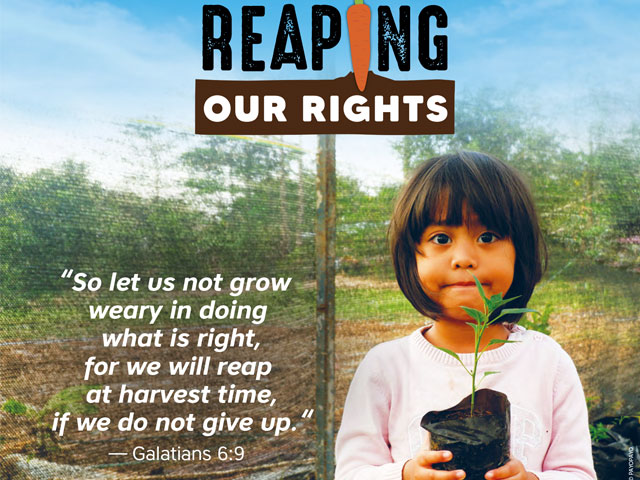Development & Peace: Reaping Our Rights

Dear sisters and brothers in Christ,
Good day!
My name is Audrey Ross. I am speaking to you as a member of Development and Peace — Caritas Canada, the official international development and solidarity organization of the Canadian Catholic Church. Development and Peace — Caritas Canada works with partner organizations and communities all over the world that are striving for justice and working for peace. Every Lent, with the help of the Canadian Conference of Catholic Bishops, we mobilize thousands of Canadians to support our partners. I want to share a scenario with you to demonstrate how important your support really is.
Imagine you are a potato farmer. During the planting season, you spend hours keeping an eye on the weather, preparing the soil, planting seed potatoes, thinking about how to prevent pests and animals from damaging them, and planning how you’ll get those potatoes to market. It’s hard work, but you know how to do it, and your family has been farming potatoes for generations. Months go by as your root vegetables sprout in the dark earth underground, with rows of leaves shooting up to let you know they’re still there. One day, you decide it’s time to pull up a few potatoes and see how things are going. But when you pull the first plant, you discover something strange. It’s covered in an oily film. You pull up a few more to discover the same thing. The crop is ruined! How did this happen?
You remember that an oil company moved into town, not far from you, before you started planting. The oil has seeped into your soil. Generations of work, tradition and knowledge are suddenly undone. The company denies it did anything wrong, but your potatoes are right in front of you, covered in oil. How will you provide for yourself and your family?
This scene might seem strange, but it is happening right now in Nigeria, where farmers who grow cassava, a root vegetable, are finding their crops ruined by an unaccountable oil industry. Oil and other industries have a lot of money and power to avoid taking responsibility for harm that they cause. Small-scale farmers often have barely enough money to get by, let alone taking on a large corporation. That’s why we collect funds for our partners, like HOMEF, the Home of Mother Earth Foundation in Nigeria, which is working with farmers to help them understand their rights, analyze what is happening to them and demand justice.
During Lent, we’re also sharing stories of how PAYOPAYO [pronounced “pie-oh pie-oh”], our partner in Indonesia, is training the next generation of farmers in ecologically responsible techniques. And in Bolivia, the NUNA foundation is supporting Indigenous and farming communities to produce sustainably. These partners and others like them can do this important work thanks to the generosity of donors like you.
As we reflect in this Lenten season on Jesus’s life and ministry to the most vulnerable people of his time, please give generously to Development and Peace ― Caritas Canada. Your gift will ensure that our partners can continue to support the most vulnerable people in our global family.
Thank you for listening and for your generous support.
Event Details
- 31 March 2024
- 12:35 PM

